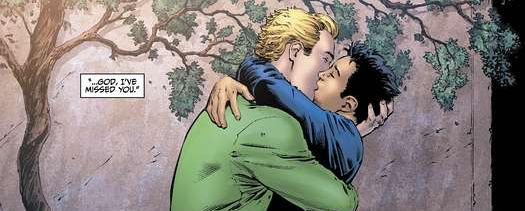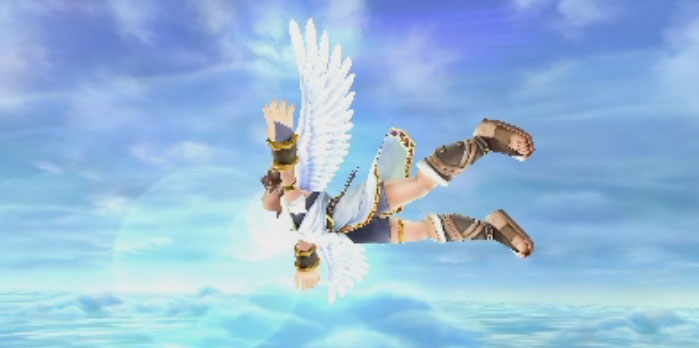
…or perhaps that should be Why it Matters to Me That Green Lantern “is Gay.”
Without any question, you’ve heard about this already. Green Lantern is gay. That “is” is a present tense verb there, folks, and that’s why I have something to say about this. It is a fact that Green Lantern is gay. It is not a fact that he was gay, or always has been gay. And that’s a problem, because as progressive as this narrative decision might intend to be, it’s actually quite reductive, ignorant, and insulting.
The problem isn’t that there’s a major gay superhero now, no matter what the Parents Against Whateverthefuck groups would have you believe…in fact, they should be cheering this decision, because it makes it seem as though homosexuality is something that people can add and remove from their lives like an accessory or a piece of clothing…something to be picked up and worn when it suits them, and not at all until then.
That’s just downright wrong, not to mention preposterous. Homosexuality is not like facial hair…you don’t grow it out because you’re going through a phase or because you decided you’d look better that way. It’s an integral part of who people are…it’s what makes them human…and it’s always been there. It’s not a choice, any more than skin color, height, or voice is a choice. It’s part of who you are from birth, and while it might take a while for somebody to realize — or understand, or accept — that they are gay, that’s a gradual process of internal discovery…not an external feature plugged into us wholesale by some cosmic decider.
This reminds me in many ways of the hubbub over J.K. Rowling “revealing” that Dumbledore was gay, however many years ago that was. My concern then was similar, but it was overridden by my disgust for what she did to writing more than what she did to homosexuals.
In that case, it was a clear authorial trespass. As the author of her books, she was able to reveal anything she liked at any point. Until — and this is important — she finished writing them. After that, it’s hands off. She doesn’t get to reveal additional data elsewhere that isn’t sustained within the novels. I’ll admit openly that I haven’t read them…but I’ve known many people who have, and they’ve shared the same concern: there doesn’t seem to be anything in the novels that sustains such a reading. Certainly one could make it fit, just as we could make fit anything we’d like to imagine while we’re reading a book, chalking it up to it being one of the hundreds of trillions of things an author doesn’t tell us along the way but which we would like to believe is true anyway, but this isn’t a case of imagination…this is a case of after the fact authorial insistence.
Whatever else it may be, that’s bad writing. Either Dumbledore was gay all along and Rowling didn’t know how to handle that as an author and so she just stored it away for later blurting at a press conference, or he wasn’t gay until the moment she said he was, at which point she demonstrated an enormous disrespect to the world she created, and the imaginations of her readers that have taken them in other directions. Readers are supposed to meet books halfway…whatever they get out of it, whatever they hear, wherever their magical journey takes them, then that’s what they get from the experience. Rowling of all people should have known better about magical journeys. The author doesn’t get to inject details via syringe long after the fact.
In this case, though, it’s a comic book. Comic books have multiple authors, they span multiple generations, and there’s not just one author. What one might use as the groundwork for his character might be manipulated, discarded, or inverted by his successor. We can argue about the merits of that as well, but, for now, it’s a fact we have to take as read.
The problem, though, is that it’s still the same character. It’s a character that’s had a wealth of experiences and left an enormous imprint on his fans…fans who know every detail about what he’s actually said, done, and accomplished.
And now he’s gay. Just like that.
He wasn’t gay in the background. He wasn’t coming to grips with his sexuality for years. And he wasn’t just waiting for the perfect moment to reveal to those who care about him that he harbors a secret. He was just one thing yesterday, and another today. He donned his homosexuality like a wristwatch. Maybe he’ll like this wristwatch, or maybe he’ll take it off again once everybody gets annoyed by its loud ticking.
That’s unfair. That’s not how homosexuality works…scratch that. That’s not how humanity works. That’s not how people work.
It’s not a decision, it’s not an immediate restructuring. This is something people learn over the course of a lifetime. For Green Lantern and Dumbledore, apparently, they just become gay because someone said so. That’s terrible writing, and even worse humanity.
Regarding this radical change in which one person we’ve been learning about for so many years is killed off and replaced by a person similar in all ways but also gay, writer James Robinson said this: “It’s a realistic depiction of society. You have to move with the times.”
You’re not moving with the times at all. You’re reducing homosexuality to a character trait that can be picked up or discarded at will…that’s emphatically behind the times. That’s the mentality that keeps gays from marrying, or being recognized as functional human beings. If someone can just snap into gayness, well, just don’t snap that way and you can marry and be respected and do all the things us normal folks so love to do. That’s wrong, Robinson.
That’s wrong.
Think of it as though this weren’t a question of sexuality. Think of it as though this were a question of race. Batman, in an issue to debut next month, is revealed to be black.
Not a new Batman. Not somebody else who becomes Batman because Bruce Wayne dies. But the Batman we know. The same guy. The dead parents, the wise butler, the wonderful toys. The one we’ve seen in countless movies and comics and on television.
He’s black. And he always was. That’s the grand reveal.
Could that possibly make any sense whatsoever? It’d be absurd. It wouldn’t get people up in arms about reductivism, because it’d so clearly be impossible.
That’s what we’re dealing with now. Only the impossibility is being ignored. Not debated…just ignored.
I can’t think of a worse way to treat homosexuals than by demeaning the fact that their sexuality has shaped them, affected their lives, and helped them grow into the individuals they are today.
Green Lantern is gay, Batman is black, Wonder Woman actually contains a misplaced space and she’s really Wonderwo Man, and Poochie died on the way back to his home planet.
“It makes sense because we said it makes sense. It goes this way because we say it goes this way.” I don’t know about you, but I can’t think of anything worse than that to say to a homosexual man, woman, or child today.

